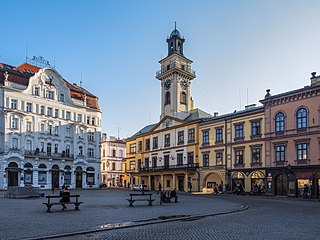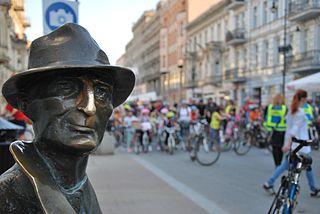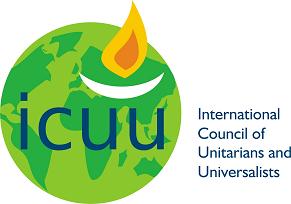
The International Council of Unitarians and Universalists (ICUU) is an umbrella organization founded in 1995 bringing together many Unitarian, Universalist, and Unitarian Universalist organizations. The size of the affiliated organizations varies widely. Some groups represent only a few hundred people; while the largest, the Unitarian Universalist Association, has over 160,000 members and is larger than all the other groups put together.

Unitarian Universalist Association (UUA) is a liberal religious association of Unitarian Universalist congregations. It was formed in 1961 by the consolidation of the American Unitarian Association and the Universalist Church of America. Both of these predecessor organizations began as Christian denominations of the Unitarian and Universalist varieties respectively. However, modern Unitarian Universalists see themselves as a separate religion with its own beliefs and affinities. They define themselves as non-creedal, and draw wisdom from various religions and philosophies, including humanism, pantheism, Christianity, Hinduism, Buddhism, Taoism, Judaism, Islam, and Earth-centered spirituality. Thus, the UUA is a syncretistic religious group with liberal leanings.

Unitarian Universalism (UU) is a liberal religion characterized by a "free and responsible search for truth and meaning". Unitarian Universalists assert no creed, but instead are unified by their shared search for spiritual growth. As such, their congregations include many atheists, agnostics, and theists within their membership. The roots of Unitarian Universalism lie in liberal Christianity, specifically Unitarianism and universalism. Unitarian Universalists state that from these traditions comes a deep regard for intellectual freedom and inclusive love. Congregations and members seek inspiration and derive insight from all major world religions.

Socinianism is a system of Christian doctrine named for Fausto Sozzini, which was developed among the Polish Brethren in the Minor Reformed Church of Poland during the 16th and 17th centuries and embraced by the Unitarian Church of Transylvania during the same period. It is most famous for its nontrinitarian Christology but contains a number of other unorthodox beliefs as well.

Raków is a village in Kielce County, Świętokrzyskie Voivodeship, in south-central Poland. It is the seat of the gmina called Gmina Raków. It lies in historic Lesser Poland, approximately 39 km (24 mi) south-east of the regional capital Kielce. The village has a population of 1,213.
The Religious Coalition for Reproductive Choice (RCRC) is a pro-choice organization founded in 1973 by clergy and lay leaders from mainline denominations and faith traditions to create an interfaith organization following the 1973 U.S. Supreme Court decision legalizing abortion in the U.S. In 1993, the original name - the Religious Coalition for Abortion Rights (RCAR) - was changed to the Religious Coalition for Reproductive Choice.
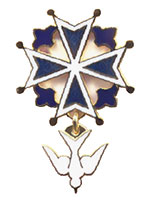
The Polish Reformed Church, officially called the Evangelical Reformed Church in the Republic of Poland is a historic Reformed Protestant church in Poland established in the 16th century, still in existence today.
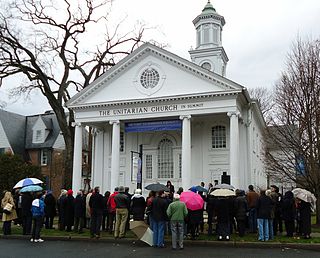
Unitarian Universalism and the Unitarian Universalist Association (UUA) have a long-standing tradition of welcoming LGBT people.

Karol Cyryl Modzelewski is a Polish historian, writer, politician and academic.
Biblical Unitarianism encompasses the key doctrines of nontrinitarian Christians who affirm the Bible as their sole authority, and from it base their beliefs that God the Father is a singular being, the only one God, and that Jesus Christ is God’s son, but not divine. The term "biblical Unitarianism" is connected first with Robert Spears and Samuel Sharpe of the Christian Life magazine in the 1880s. It is a neologism that gained increasing currency in nontrinitarian literature during the 20th century as the mainstream Unitarian churches moved away from belief in the Bible and, in the United States, towards merger with Universalism. It has been used since the late 19th century by conservative Christian Unitarians, and sometimes by historians, to refer to Scripture-fundamentalist Unitarians of the 16th–18th centuries. Its use is problematic in that Unitarians from the 17th to the 20th centuries all had attachment to the Bible, but in differing ways.
Martin Czechowic (c.1532–1613) was a Polish Socinian (Unitarian) minister, Protestant reformer, theologian and writer.
Unitarianism, as a Christian denominational family of churches, was first defined in Poland-Lithuania and Transylvania in the late 16th century. It was then further developed in England and America until the early 19th century, although theological ancestors are to be found as far back as the early days of Christianity. It matured and reached its classical form in the middle 19th century. Later historical development has been diverse in different countries.

All Souls Unitarian Church is a Unitarian Universalist ("UU") church in Tulsa, Oklahoma. It is one of the largest UU congregations in the world.

The Universalist-Unitarian Church is a historic church on Silver Street and Elm Street in Waterville, Maine in the United States. Built in 1832 for a Universalist congregation founded in 1826, it is a prominent local example of transitional Federal-Gothic Revival architecture. It was listed on the National Register of Historic Places in 1978.
Grzegorz Paweł z Brzezin (1525–1591), was a Socinian (Unitarian) writer and theologian, one of the principal creators and propagators of radical wing of the Polish Brethren, and author of several of the first theological works in Polish, which helped to the development of literary Polish.

Reverend Robin Noelle Tanner is an American Unitarian Universalist minister notable for her activism for the causes of religious freedom and civil rights. Reverend Tanner is the Minister of Worship and Outreach at Beacon Unitarian Universalist Congregation in Summit. From 2010 to 2016, she was lead minister at the Piedmont Unitarian Universalist Church in Charlotte and Salisbury in North Carolina. Tanner is a lesbian who married her partner in 2014 and has performed marriage services for same-sex couples. In 2014, Tanner joined the United Church of Christ in an innovative lawsuit challenging prohibitions against marrying same-sex couples. This lawsuit took the novel position that the laws restricted the ministers' freedom of religion. The suit was successful: On October 10, 2014, the federal district court for western North Carolina struck down the ban on same-sex marriage. Reverend Tanner also worked to overturn HB2, the North Carolina law that was passed in March 2016 to ban individuals from using a public bathroom that does not match the person's biological sex. The law also prevented cities from passing rules to protect gay and transgender people from discrimination. In spite of challenges and an apparent agreement between the city of Charlotte and the state to repeal both the Charlotte anti-discrimination ordinances and HB2, HB2 remains in effect. She is an advocate for equal opportunity, voting rights for Latino and African-Americans, raising the minimum wage, marriage equality, as well as other issues. In July 2017, she was arrested while protesting outside the office of senator Mitch McConnell, as part of an effort of "moral obedience" or civil disobedience, to espouse the cause of health care being a fundamental human right. In January 2017, she began serving as the Minister of Worship and Outreach at the Beacon Unitarian Universalist Congregation in Summit, New Jersey. In July 2017, Tanner protested the GOP healthcare plan to repeal the Affordable Care Act by bringing a coffin to the offices of congressional leaders, and was arrested for her civil disobedience.
We are a moral movement, rising up in resistance to the cruelness of this Congress. We are commanded by a moral imperative to care for the sick. Forget partisan politics, forget left and right, forget Republican and Democrat, we are commanded to take care of the people ― our people.

The First Universalist Church of Atlanta, organized in 1895, re-established a Universalist presence in Atlanta, Georgia. Initial missionary efforts in 1879 were short-lived and failed to establish a permanent presence in the city. With the explicit assistance the Young People's Christian Union, this second missionary effort enabled the Universalists to sustain their presence and construct a church building on East Harris in 1900. The Universalists occupied the church until 1918 when they merged with Atlanta's Unitarians.
